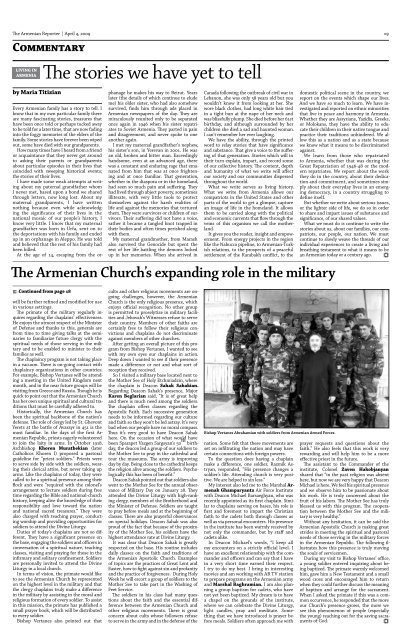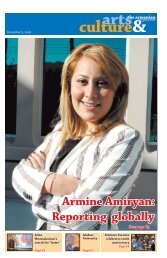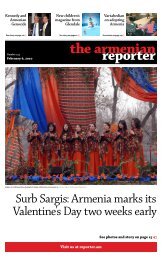National, International, Armenia, and Community News and Opinion
National, International, Armenia, and Community News and Opinion
National, International, Armenia, and Community News and Opinion
You also want an ePaper? Increase the reach of your titles
YUMPU automatically turns print PDFs into web optimized ePapers that Google loves.
The <strong>Armenia</strong>n Reporter | April 4, 2009 19<br />
Commentary<br />
Living in<br />
<strong>Armenia</strong><br />
The stories we have yet to tell<br />
by Maria Titizian<br />
Every <strong>Armenia</strong>n family has a story to tell. I<br />
know that in my own particular family there<br />
are many fascinating stories, treasures that<br />
have been once told or perhaps tucked away<br />
to be told for a later time, that are now fading<br />
into the foggy memories of the elders of the<br />
family. Some stories have forever been wiped<br />
out, some have died with our gr<strong>and</strong>parents.<br />
How many times have I heard from a friend<br />
or acquaintance that they never got around<br />
to asking their parents or gr<strong>and</strong>parents<br />
about particular episodes in their lives that<br />
coincided with sweeping historical events;<br />
the stories of their lives.<br />
I have made some weak attempts at writing<br />
about my paternal gr<strong>and</strong>father whom<br />
I never met, based upon a bond we shared<br />
through letters, now long lost. About my<br />
maternal gr<strong>and</strong>parents, I have written<br />
nothing because even while acknowledging<br />
the significance of their lives in the<br />
national mosaic of our people’s history, I<br />
know very little. I know that my maternal<br />
gr<strong>and</strong>father was born in Urfa, sent on to<br />
the deportations with his family <strong>and</strong> ended<br />
up in an orphanage in Aleppo. He was told<br />
<strong>and</strong> believed that the rest of his family had<br />
been killed.<br />
At the age of 14, escaping from the orphanage<br />
he makes his way to Beirut. Years<br />
later (the details of which continue to elude<br />
me) his older sister, who had also somehow<br />
survived, finds him through ads placed in<br />
<strong>Armenia</strong>n newspapers of the day. They are<br />
miraculously reunited only to be separated<br />
once again in 1946 when his sister repatriates<br />
to Soviet <strong>Armenia</strong>. They parted in pain<br />
<strong>and</strong> disagreement, <strong>and</strong> never spoke to one<br />
another again.<br />
I met my maternal gr<strong>and</strong>father’s nephew,<br />
his sister’s son, in Yerevan in 2001. He was<br />
an old, broken <strong>and</strong> bitter man. Exceedingly<br />
h<strong>and</strong>some, even at an advanced age, there<br />
was a constant <strong>and</strong> enduring rage that emanated<br />
from him that was at once frightening<br />
<strong>and</strong> at once familiar. That generation,<br />
whether in the diaspora or in the homel<strong>and</strong>,<br />
had seen so much pain <strong>and</strong> suffering. They<br />
had lived through abject poverty, sometimes<br />
illiterate, with very little tools to protect<br />
themselves against the harsh realities of<br />
life <strong>and</strong> against the memories that tortured<br />
them. They were survivors or children of survivors.<br />
Their suffering did not have a voice,<br />
rather it became a tangled knot trapped in<br />
their bodies <strong>and</strong> often times perished along<br />
with them.<br />
My maternal gr<strong>and</strong>mother, from Marash<br />
also survived the Genocide but spent the<br />
rest of her life battling the demons locked<br />
up in her memories. When she arrived in<br />
Canada following the outbreak of civil war in<br />
Lebanon, she was only 58 years old but you<br />
wouldn’t know it from looking at her. She<br />
wore black clothes, had long white hair tied<br />
in a tight bun at the nape of her neck <strong>and</strong><br />
was blissfully plump. She died before her 61st<br />
birthday, <strong>and</strong> although surrounded by her<br />
children she died a sad <strong>and</strong> haunted woman.<br />
I can’t remember her ever laughing.<br />
We have the ability, through the printed<br />
word to relay stories that have significance<br />
<strong>and</strong> substance. That give a voice to the suffering<br />
of that generation. Stories which will in<br />
their turn explain, impart, <strong>and</strong> record some<br />
of our collective history. The content, depth<br />
<strong>and</strong> humanity of what we write will affect<br />
our society <strong>and</strong> our communities dispersed<br />
throughout the world.<br />
What we write serves as living history.<br />
What we write from <strong>Armenia</strong> allows our<br />
compatriots in the United States <strong>and</strong> other<br />
parts of the world to get a glimpse, capture<br />
an image of life in the homel<strong>and</strong>. It allows<br />
them to be carried along with the political<br />
<strong>and</strong> economic currents that flow through the<br />
veins of this organism we call the motherl<strong>and</strong>.<br />
It gives you the reader, insight <strong>and</strong> empowerment.<br />
From energy projects in the region<br />
like the Nabucco pipeline, to <strong>Armenia</strong>n-Turkish<br />
relations, to the prospects of a peaceful<br />
settlement of the Karabakh conflict, to the<br />
The <strong>Armenia</strong>n Church’s exp<strong>and</strong>ing role in the military<br />
domestic political scene in the country, we<br />
report on the events which shape our lives.<br />
And we have so much to learn. We have investigated<br />
<strong>and</strong> reported on ethnic minorities<br />
that live in peace <strong>and</strong> harmony in <strong>Armenia</strong>.<br />
Whether they are Assyrians, Yazidis, Greeks,<br />
or Molokans, they have the ability to educate<br />
their children in their native tongue <strong>and</strong><br />
practice their traditions unhindered. We allow<br />
this as a nation <strong>and</strong> as a state because<br />
we know what it means to be discriminated<br />
against.<br />
We learn from those who repatriated<br />
to <strong>Armenia</strong>, whether that was during the<br />
Great Repatriation of 1946-48 or the modern<br />
repatriates. We report about the work<br />
they do in the country, about their dedication<br />
<strong>and</strong> commitment, <strong>and</strong> sometimes simply<br />
about their everyday lives in an emerging<br />
democracy, in a country struggling to<br />
define itself.<br />
But whether we write about serious issues,<br />
or the lighter side of life, we do so in order<br />
to share <strong>and</strong> impart issues of substance <strong>and</strong><br />
significance, of our shared values.<br />
What we must do is continue to write the<br />
stories about us, about our families, our compatriots,<br />
our people, our nation. We must<br />
continue to slowly weave the threads of our<br />
individual experiences to create a living <strong>and</strong><br />
breathing testament to what it means to be<br />
an <strong>Armenia</strong>n today or a century ago. f<br />
n Continued from page 18<br />
will be further refined <strong>and</strong> modified for use<br />
in various settings.<br />
The primate of the military regularly inquires<br />
regarding the chaplains’ effectiveness.<br />
He enjoys the utmost respect of the Minister<br />
of Defense <strong>and</strong> thanks to this, generals are<br />
from time to time giving talks at the seminaries<br />
to familiarize future clergy with the<br />
spiritual needs of those serving in the military<br />
<strong>and</strong> to be enabled to minister to their<br />
families as well.<br />
The chaplaincy program is not taking place<br />
in a vacuum. There is on-going contact with<br />
chaplaincy organizations in other countries.<br />
For example, Bishop Vertanes will be attending<br />
a meeting in the United Kingdom next<br />
month, <strong>and</strong> in the near future groups will be<br />
visiting from Greece <strong>and</strong> Russia. Though he is<br />
quick to point out that the <strong>Armenia</strong>n Church<br />
has her own unique spiritual <strong>and</strong> cultural traditions<br />
that must be carefully adhered to.<br />
Historically, the <strong>Armenia</strong>n Church has<br />
been the spiritual backbone of the nation’s<br />
defense. The role of clergy led by St. Ghevont<br />
Yerets at the battle of Avarayr in 451 is the<br />
most familiar. In the days of the first <strong>Armenia</strong>n<br />
Republic, priests eagerly volunteered<br />
to join the laity in arms. In October 1918,<br />
Archbishop Khoren Muratbekian (later<br />
Catholicos Khoren I) proposed a pastoral<br />
guideline for “priest soldiers.” Priests were<br />
to serve side by side with the soldiers, wearing<br />
their clerical attire, but never taking up<br />
arms. Like the chaplains of today, they were<br />
called to be a spiritual presence among their<br />
flock <strong>and</strong> were “required with the colonel’s<br />
arrangement to lecture soldiers during free<br />
time regarding the Bible <strong>and</strong> national-church<br />
history, keeping alive the knowledge of their<br />
responsibility <strong>and</strong> love toward the nation<br />
<strong>and</strong> national sacred treasures.” They were<br />
also charged with teaching prayer, conducting<br />
worship <strong>and</strong> providing opportunities for<br />
soldiers to attend the Divine Liturgy.<br />
Duties of today’s chaplains are not so different.<br />
They have a significant presence on<br />
the base, engaging the soldiers <strong>and</strong> officers in<br />
conversation of a spiritual nature, teaching<br />
classes, visiting <strong>and</strong> praying for those in the<br />
infirmary <strong>and</strong> solitary confinement. Soldiers<br />
are personally invited to attend the Divine<br />
Liturgy in a local church.<br />
In terms of vision, the primate would like<br />
to see the <strong>Armenia</strong>n Church be represented<br />
on the highest level in the military <strong>and</strong> that<br />
the clergy chaplains truly make a difference<br />
in the military by assisting in the moral <strong>and</strong><br />
religious formation of every soldier. To assist<br />
in this mission, the primate has published a<br />
small prayer book, which will be distributed<br />
to every soldier.<br />
Bishop Vertanes also pointed out that<br />
cults <strong>and</strong> other religious movements are ongoing<br />
challenges, however, the <strong>Armenia</strong>n<br />
Church is the only religious presence, which<br />
enjoys official recognition. No other group<br />
is permitted to proselytize in military facilities<br />
<strong>and</strong> Jehovah’s Witnesses refuse to serve<br />
their country. Members of other faiths are<br />
certainly free to follow their religious convictions<br />
<strong>and</strong> chaplains do not discriminate<br />
against members of other churches.<br />
After getting an overall picture of this program<br />
from Bishop Vertanes, I wanted to see<br />
with my own eyes our chaplains in action.<br />
Deep down I wanted to see if their presence<br />
made a difference or not <strong>and</strong> what sort of<br />
reception they received.<br />
So I visited a military base located next to<br />
the Mother See of Holy Etchmiadzin, where<br />
the chaplain is Deacon Sahak Sahakian.<br />
Regarding Deacon Sahak’s presence, Major<br />
Karen Beglarian said, “It is of great help<br />
<strong>and</strong> there is much need among the soldiers.<br />
The chaplain offers classes regarding the<br />
Apostolic Faith. Each successive generation<br />
needs to be informed regarding our culture<br />
<strong>and</strong> faith so they won’t be led astray. It’s very<br />
bad when our people have no moral compass.<br />
Thus it’s very good to have Deacon Sahak<br />
here. On the occasion of what would have<br />
been Sparapet Vazgen Sargsyan’s 50 th birthday,<br />
the deacon led a group of our soldiers to<br />
the Mother See to pray in the cathedral <strong>and</strong><br />
tour the museums. The army is improving<br />
day by day. Being close to the cathedral keeps<br />
the religion alive among the soldiers. Psychologically<br />
this has been of benefit.”<br />
Deacon Sahak pointed out that soldiers also<br />
went to the Mother See for the annual observance<br />
of Military Day on January 28. They<br />
attended the Divine Liturgy with high-ranking<br />
clergy, members of the Brotherhood <strong>and</strong><br />
the Minister of Defense. Soldiers are taught<br />
to pray before meals <strong>and</strong> at the beginning of<br />
classes. There are also prayerful observances<br />
on special holidays. Deacon Sahak was also<br />
proud of the fact that because of the proximity<br />
of the Mother See, his soldiers have the<br />
highest attendance rate at Divine Liturgy.<br />
It was clear that Deacon Sahak is greatly<br />
respected on the base. His routine includes<br />
daily classes on the faith <strong>and</strong> traditions of<br />
the <strong>Armenia</strong>n Apostolic Church. Examples<br />
of topics are the practices of Great Lent <strong>and</strong><br />
Easter, how to fight against sin <strong>and</strong> profanity<br />
<strong>and</strong> the practice of forgiveness. During Holy<br />
Week he will escort a group of soldiers to the<br />
Mother See to take part in the Washing of<br />
Feet Service.<br />
The soldiers in his class had many questions<br />
about the faith <strong>and</strong> the essential difference<br />
between the <strong>Armenia</strong>n Church <strong>and</strong><br />
other religious movements. There is great<br />
concern about cults whose followers refuse<br />
to serve in the army <strong>and</strong> in the defense of the<br />
Bishop Vertanes Abrahamian with soldiers from <strong>Armenia</strong>n Armed Forces.<br />
nation. Some felt that these movements are<br />
set on infiltrating the nation <strong>and</strong> may have<br />
certain connections with foreign powers.<br />
To the question does having a chaplain<br />
make a difference, one soldier, Razmik Astryan,<br />
responded, “His presence changes a<br />
soldier’s life. Attending church is very positive.<br />
We are helped to sin less.”<br />
My interest also led me to the Marshal Armenak<br />
Ghamparyantz Air Force Institute<br />
with Deacon Michael Barsaeghyan, who was<br />
recently appointed as its first chaplain. Similar<br />
to chaplains serving on bases, his role is<br />
first <strong>and</strong> foremost to impart the Christian<br />
faith to the cadets both through classes as<br />
well as via personal encounters. His presence<br />
in the institute has been warmly received by<br />
not only the comm<strong>and</strong>er, but by staff <strong>and</strong><br />
cadets alike.<br />
In Deacon Michael’s words, “I keep all<br />
my encounters on a strictly official level. I<br />
have an excellent relationship with the comm<strong>and</strong>er<br />
<strong>and</strong> officers <strong>and</strong> can say that I have<br />
in a very short time earned their respect.<br />
I try to do my best. I bring in interesting<br />
movies <strong>and</strong> am working with AR TV station<br />
to prepare programs on the <strong>Armenia</strong>n army<br />
<strong>and</strong> Marshal Baghramian. I am also planning<br />
a group baptism for cadets, who have<br />
not yet been baptized. My dream is to have<br />
a chapel on the grounds of the institute,<br />
where we can celebrate the Divine Liturgy,<br />
light c<strong>and</strong>les, pray <strong>and</strong> meditate. Something<br />
that we have introduced is prayer before<br />
meals. Soldiers often approach me with<br />
prayer requests <strong>and</strong> questions about the<br />
faith.” He also feels that this work is very<br />
rewarding <strong>and</strong> will help him to be a more<br />
effective priest in the future.<br />
The assistant to the Comm<strong>and</strong>er of the<br />
institute, Colonel Zaven Hakobjanyan<br />
shared that “in the past religion was absent<br />
here, but now we are very happy that Deacon<br />
Michael is here. We feel his spiritual presence<br />
<strong>and</strong> we observe him to be passionate about<br />
his work. He is truly concerned about the<br />
fruit of his labors. The Mother See has truly<br />
blessed us with this program. The cooperation<br />
between the Mother See <strong>and</strong> the military<br />
is very healthy.”<br />
Without any hesitation, it can be said the<br />
<strong>Armenia</strong>n Apostolic Church is making great<br />
strides in meeting the spiritual <strong>and</strong> pastoral<br />
needs of those serving in the military forces<br />
in the <strong>Armenia</strong>n Republic. The following illustrates<br />
how this presence is truly moving<br />
the souls of servicemen.<br />
During my visit to Bishop Vertanes’ office,<br />
a young soldier entered inquiring about being<br />
baptized. The primate warmly welcomed<br />
him, gave him a New Testament <strong>and</strong> a small<br />
wood cross <strong>and</strong> encouraged him to return<br />
when they could further discuss the meaning<br />
of baptism <strong>and</strong> arrange for the sacrament.<br />
When I asked the primate if this was a common<br />
occurrence, he responded that the more<br />
our Church’s presence grows, the more we<br />
see this phenomenon of people (especially<br />
the young) reaching out for the saving sacraments<br />
of God.<br />
f

















